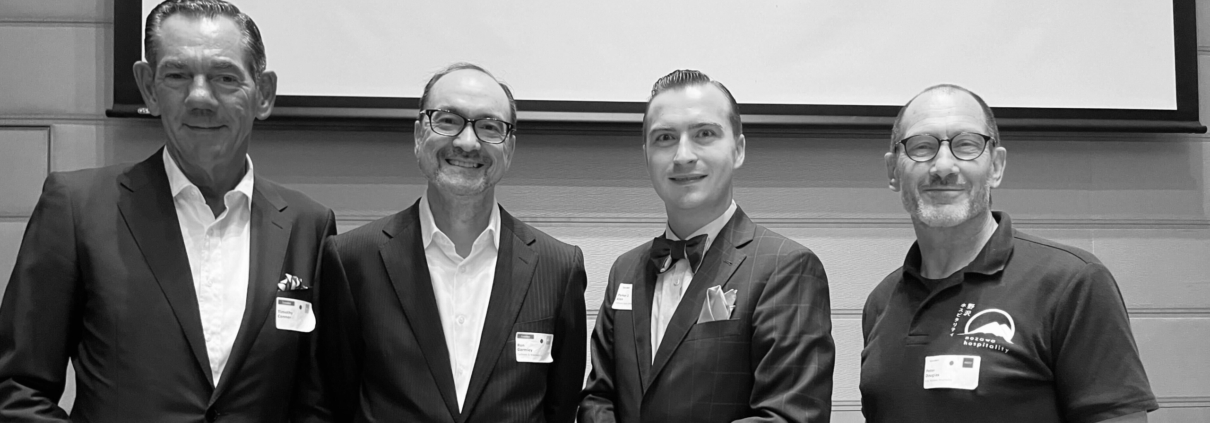Exploring the Untapped Potential of Japan’s Countryside
“We’re sitting on a gold mine, that’s yet to be tapped.”
On July 11, 2023, Parthenon Japan’s CEO, Parker J. Allen, spoke at the Action Leadership in Inaka event hosted by the American Chamber of Commerce in Japan (ACCJ), alongside Peter Douglas, the Representative Director of Nozawa Hospitality. With the help of moderator Ron Gormley, Chair of the ACCJ Real Estate Committee, they discussed various topics concerning the untapped potential of Japan’s inaka, or countryside.
The event began with Parker sharing Parthenon Japan’s background and mission to revitalize Japan’s countryside through a new satellite office in Ogawamachi. Peter then introduced himself and spoke about his role in Nozawa Village, a tight-knit community of 2,000 people in Nagano’s inaka, where he witnessed Japan’s transformation before and after the bubble era. He shared his thoughts on the changes that are occurring in Japan’s untapped countryside.
The conversation revolved around the advantages of conducting business in Japan’s countryside, and the positive impact new ventures have on rural communities. Douglas acknowledged the appeal of affordable real estate in Japan’s countryside, but he highlighted that after establishing their business in Nozawa, they found an “open business environment.” Despite numerous rules, both written and unwritten, they made an effort to abide by them, earning the trust of key people in the village and successfully integrating into the community.
“Establishing a business in rural Japan not only benefits the local community, but also leads to broader advantages beyond the company’s activities in the area.”
Douglas further explained the benefits of incorporating in the Japanese countryside, such as the opportunities it provides for job creation and infrastructure development. Parker added that setting up a business in the countryside is much easier compared to navigating the red-tape of a metropolis like Tokyo, and it also allows for easier access to government grants, which noted can provide work for local builders and craftspeople in the process. Both Douglas and Parker agreed that establishing a business in rural Japan not only benefits the local community, but also leads to broader advantages beyond the company’s activities in the area.
During the conversation, they also discussed the pressing challenges confronting rural Japan, such as the declining population and deteriorating infrastructure outside major population canters. The reality is indeed harsh. However, while Parker delved into the history of population shifts dating back to the Edo Period, Douglas expressed optimism. He believed that although it’s inevitable that some rural communities will fade, those that can adapt will thrive.
“…Akiya – vacant houses – can be bought for $500, but this often overlooks the substantial costs associated with renovating these properties.”
The discussion then shifted to rural real estate, prompting further exploration of akiya – or vacant houses in rural Japan – a topic on which Parker has gained some subject matter expertise. He dispelled some misconceptions, like the actual percentage of akiya likely being double the often-cited government statistic of 8+ million houses across Japan. His first-hand experience revealed that most akiya are not for sale, as they are often held by families or their inheritance status remains unknown. Parker also addressed the popularized media narrative that has captivated large numbers of people outside Japan that these houses can be bought for $500. He said that while such houses do exist, they are almost 100% in disrepair and the cheap price overlooks the substantial costs associated with renovating these properties.
The conversation moved to government incentives and programs aimed at promoting akiya purchases in the Japanese countryside. Both Parker and Douglas acknowledged the need for better cooperation between national, prefectural, and municipal levels of government to enhance the effectiveness of these initiatives. The issue lies in the fact that so-called “Akiya Banks” are often staffed by career bureaucrats who do not possess the necessary knowledge or skills to facilitate real estate marketing and sales. Parker emphasized the importance of bringing in individuals with the required expertise to effectively sell akiya in rural areas. Douglas agreed with the need for greater cooperation within the government, but also noted the considerable resistance to change within Japanese rural communities. He said that this makes it additionally challenging to facilitate such changes effectively.



